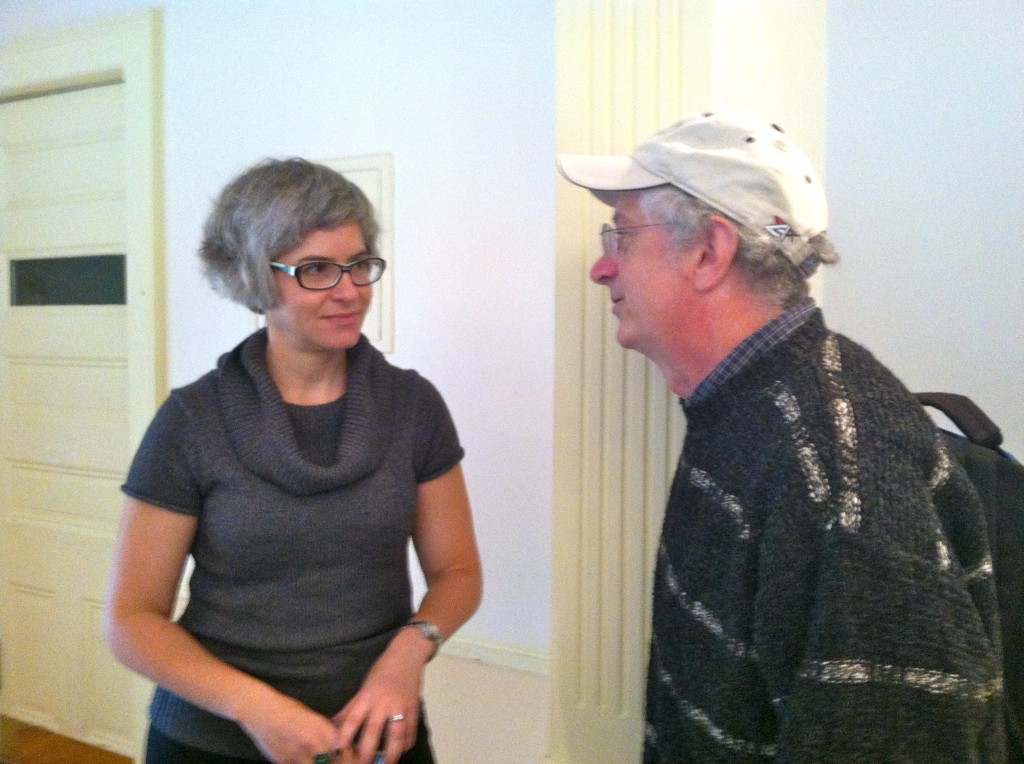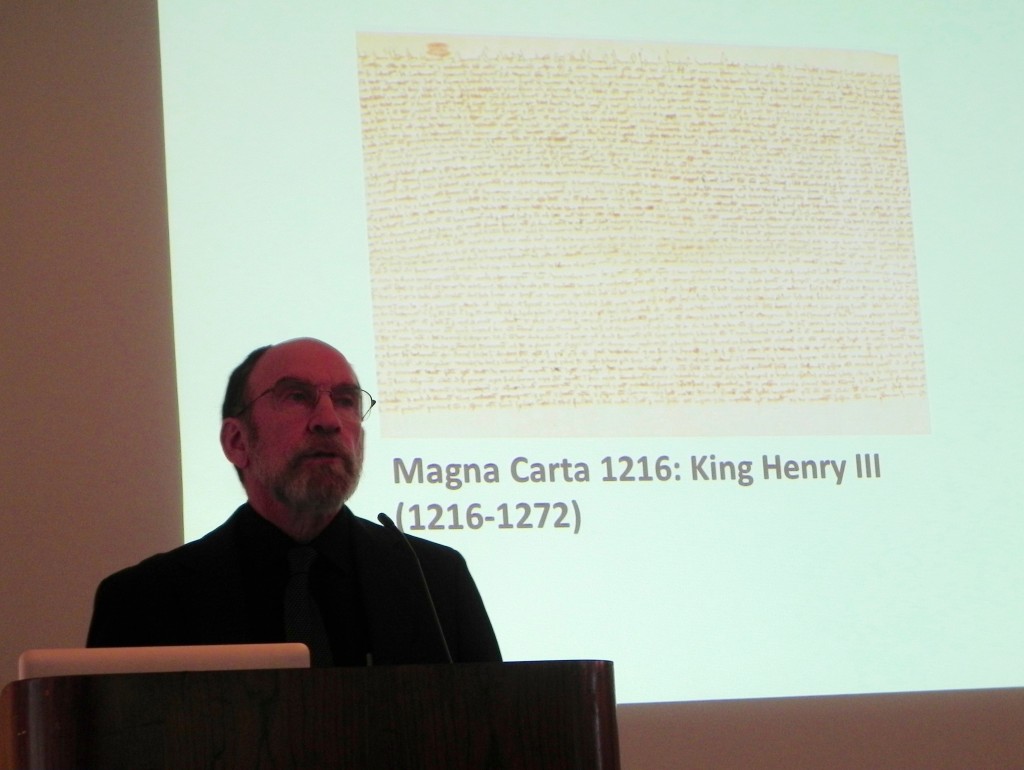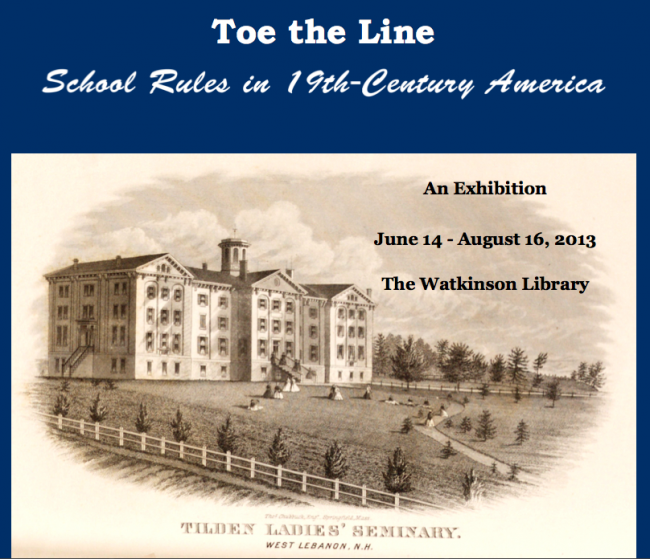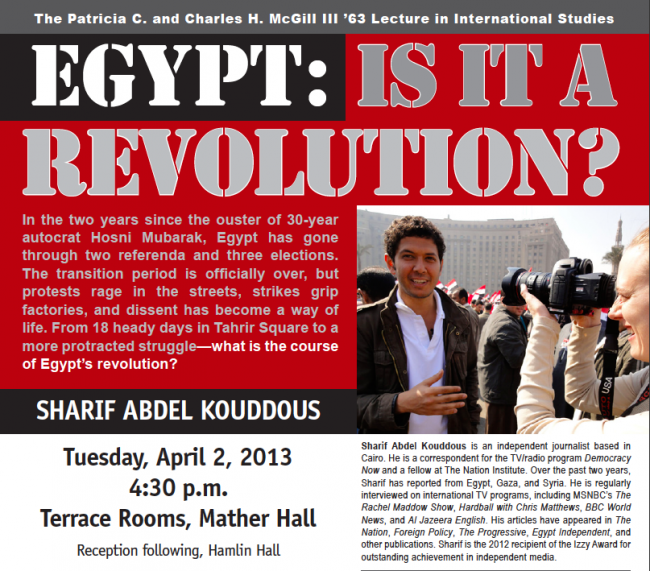Home » Events (Page 3)
Category Archives: Events
Mead Lecture & Student Reactions
On Tuesday, October 20th, Dr. Stephen D. White, Candler Professor Emeritus of Medieval History at Emory University and Visiting Professor at Harvard University delivered the History Department’s annual George J. Mead (Class of 1937) Lecture: “Magna Carta: How a Total Failure Became “the Greatest Constitutional Document of All Times.”
The Mead Lecture in History, established by a bequest in 1952, is Trinity’s most prestigious endowed annual lecture. Previous lecturers have included James McPherson, Philip Curtin, Alan Samuel, and E. P. Thompson. The fund was established in honor of George Jackson Mead of Bloomfield, Connecticut. He graduated from Choate preparatory school and the Massachusetts Institute of Technology.
Mr. Mead was a founding partner in the Pratt & Whitney Aircraft Company and the designer of its Wasp engine, whose widespread use and reliability transformed military and commercial aviation in the U.S. He later served as an advisor to President Franklin D. Roosevelt, guiding wartime aircraft production throughout the nation, and was awarded the President’s Medal of Merit in 1948. His intent was that the Mead Fund support lectures, prizes, and other programs to stimulate the study of government, economics, and history, in order to better prepare students for government service. Mr. Mead received an honorary doctorate from Trinity College in 1937.
Lecture: Education and Civil Rights in the 21st Century
On Tuesday, Sept. 23rd, Trinity College’s Office of Multicultural Affairs and La Voz Latina hosted Pedro Noguera, the Peter L. Agnew Professor of Education at New York University, who in honor of Hispanic Heritage Month spoke on Education and Civil Rights in the 21st Century. This event, which is co-sponsored by the History, Educational Studies, Political Science, Sociology, American Studies and International Studies departments.
Here are some reflections from first year students who attended this eye-opening talk:
“Professor Noguera highlighted and brought to my attention many key points and issues pertaining to our education system that I myself have struggled through in my experience as a student in the American system. There key generalized revisions in the professor suggested that our leaders and lawmakers make, but also specific advice for teachers and principals at the local level. Perhaps the most important point in the entire conversation, however, was that education for everyone benefits us all in greater ways than education solely for a privileged few” — Theo Pesiridis, Class of 2018
“Before hearing Professor Noguera talk, I had imagined him speaking in regards to the “wrong” about education and the ruthless results in education. In a way, I imagined him talking about that failures in the education system, but in actuality, Noguera mentioned successes throughout the country…In the end, he challenged the audience into going out into the community and being that small token of difference. He stated in his closing arguments: “It’s all about will”. This shows us that if we want the change in the education system, we must be willing to make the transformation.” — Giselle Galan, Class 2018
“Racial segregation does exist in the United States of America and can’t be ignored.” — Abdi Noor, Class of 2018
“While the civil rights movement is no longer the proprietor of headline news come the 21st century, education has taken over as the civil rights issue of our time…Professor Noguera, who has been studying how to improve schools for many years, pointed out how, for many of the school systems that were failing, there were schools populated by mostly white students, which received far more funding. This idea of providing schools that are the most well off with further funds is not only backwards, but is the driving the problem farther from its solution.” — Jonah Meltzer, Class 2018
Lecture: Looking for War in the Landscape

On October 23, Trinity welcomed Megan Kate Nelson, a cultural and environmental historian with two published books who currently teaches at Brown University. She led a discussion entitled “Looking for War in the Landscape/Looking for Landscapes in the War” in which she analyzed the Civil War’s impact on the land of the United States and vice versa.
Nelson conducted extensive research in Virginia guided by a fascinating question: how can we access the experiences of the Civil War? The answer, she concluded, lies right beneath our feet: the land. In her research, Nelson studied “earthworks” and other physical remains of war. Some of these lay unnoticed on the outskirts of suburbs and others were formally preserved, and still others are missing. She found that the experience evoked by these earthworks was a reflection of their location and the landscape itself.
Nelson’s current research involves a narrative history of the Civil War in the Southwest, where the diverse eco-regions of New Mexico were the site of biological warfare. Whether concerning natural or built landscapes, Nelson’s insight into the diverse connections between land and warfare is compelling for historians and non-historians alike.
Prof. Lestz Awarded Alumni Medal for Excellence

During last week’s Trinity reunion weekend, History Professor Michael Lestz was awarded the Alumni Medal for Excellence. This medal is awarded annually to alumni who have made significant contributions to their professions, to their communities, and to Trinity College. Congratulations Michael!
Read the full citation here. (more…)
Toe the Line Exhibition at the Watkinson Library
Title of Exhibit: Toe the Line School Rules in 19th-Century America
Description: School catalogs and reports drawn from the professional library of educational reformer Henry Barnard. “Henry Barnard was born on January 24, 1811, in Hartford, Connecticut. From 1837 to 1839, he belonged to the Connecticut state legislature. In 1838, he founded the Connecticut Common School journal. In 1845, he became Rhode Island commissioner of public schools. He was hired as the U.S. first commissioner of education in 1867 and resigned in 1870. Barnard died on July 5, 1900, in Hartford, Connecticut.”
Dates: June 14-August 16, 2013
Trinity Convocation 2013
The 187th Commencement of Trinity College took place on Sunday, May19th. Over 20 students received undergraduate degrees in History. In addition, Professors Antrim, Bayliss and Kassaw of the History Department won prestigious awards for their research, scholarship and teaching. Professors Antrim and Bayliss were awarded the Charles A. Dana Research Award while Professor Kassaw was this year’s recipient of the Thomas Church Brownell Prize for Teaching Excellence. Congratulations to all graduating seniors and honored faculty.
For more photos: (more…)
Prof. Kassow in Poland for 70th Anniversary of Warsaw Ghetto Uprising
 HARTFORD, CT, May 9, 2013 – Since the 2007 publication of Who Will Write Our History? Emanuel Ringelblum, the Warsaw Ghetto, and the Oyneg Shabes Archive, Samuel Kassow, Charles H. Northam Professor of History at Trinity, has won numerous awards, been elected a Fellow of the American Academy for Jewish Research, lectured often and widely, and been recognized as one of the world’s leading scholars on the Holocaust and more specifically, the fate of Jews in Poland. Just last month, Kassow was invited to Warsaw to commemorate the 70th anniversary of the Warsaw Ghetto uprising and was asked to speak at the unofficial opening of the Museum of the History of Polish Jews. The five-day event, April 18-22, was somber yet uplifting and featured a number of dignitaries and notable organizations, including the president of Poland, Bronislaw Komorowski; the Israeli Philharmonic and conductor Zubin Mehta; philanthropic organizations; human rights activists; scholars; and Simcha Rotem, one of the last survivors of the ghetto uprising. “It was really, really amazing,” said Lisa Kassow, director of Trinity Hillel and Sam’s wife. “The anniversary of the Ghetto uprising overtook the entire city. There was nothing else going on. Everywhere you turned, there were advertisements about events and Jewish issues.””
HARTFORD, CT, May 9, 2013 – Since the 2007 publication of Who Will Write Our History? Emanuel Ringelblum, the Warsaw Ghetto, and the Oyneg Shabes Archive, Samuel Kassow, Charles H. Northam Professor of History at Trinity, has won numerous awards, been elected a Fellow of the American Academy for Jewish Research, lectured often and widely, and been recognized as one of the world’s leading scholars on the Holocaust and more specifically, the fate of Jews in Poland. Just last month, Kassow was invited to Warsaw to commemorate the 70th anniversary of the Warsaw Ghetto uprising and was asked to speak at the unofficial opening of the Museum of the History of Polish Jews. The five-day event, April 18-22, was somber yet uplifting and featured a number of dignitaries and notable organizations, including the president of Poland, Bronislaw Komorowski; the Israeli Philharmonic and conductor Zubin Mehta; philanthropic organizations; human rights activists; scholars; and Simcha Rotem, one of the last survivors of the ghetto uprising. “It was really, really amazing,” said Lisa Kassow, director of Trinity Hillel and Sam’s wife. “The anniversary of the Ghetto uprising overtook the entire city. There was nothing else going on. Everywhere you turned, there were advertisements about events and Jewish issues.””
(more…)
Class of 2013 History Prizes at 63rd Annual Honors Day

“HARTFORD, CT, May 3, 2013 – The Trinity College Chapel served as the site Friday, May 3 for the school’s 63rd annual Honors Day Ceremony in which more than 200 students were cited for their scholarly, athletic and community-oriented achievements. Some students were recognized more than once. The honorees, which included members of the Classes of 2013, ’14, ’15 and ’16, were presented with a broad array of prizes and awards for their contributions and accomplishments over the years. The ceremony originated when George Keith Funston, who served as Trinity College President from 1945 to 1951, sought to re-establish the school’s academic pageantry, which had been halted during World War II. Matriculation and the Book Ceremony for first-year students were restored, and in the spring of 1950, Honors Day was added as a new event. It was intended to be an occasion when all Trinity prizes and awards — with the exception of those handed out at Commencement – could be celebrated in the presence of the entire College community.” (source: http://www.trincoll.edu/NewsEvents/NewsArticles/pages/HonorsDay2013.aspx)
Congratulations to all of the following the history majors awarded prizes:
(more…)
The McGill Lecture: Egypt: is it A Revolution?
HARTFORD, CT, April 4, 2013 – “The 18 heady days of rebellion in Cairo’s Tahrir Square in January 2011 were filled with hope, promise and the expectation of a better life. But the events of the past two years have not unfolded as envisioned by the tens of thousands of Egyptians who took part in the Tahrir Square demonstrations that led to the ouster of longtime President Hosni Mubarak. Sharif Abdel Kouddous delivers the annual Patricia C. and Charles H. McGill III ’63 Lecture in International Studies. Those were among the major conclusions drawn by Sharif Abdel Kouddous, an independent Cairo-based journalist, who on Tuesday delivered the annual Patricia C. and Charles H. McGill III ’63 Lecture in International Studies in Mather Hall. Kouddous’ lecture was entitled, “Egypt: Is it a Revolution?” The overthrow of Mubarak, an autocrat who had been in power for three decades, was among the first of several uprisings in the Middle East that came to be known as the Arab Spring, and were thought to be the beginnings of democracy taking root in countries where dictatorships had long flourished. Indeed, in the immediate aftermath of Mubarak’s ouster, “foreigners would smile and congratulate me,” said Kouddous. “Today I get a much different reaction – a look of pity. People ask me, ‘What happened?’ Is the revolution over?’ What are the prospects fos for change?’”




